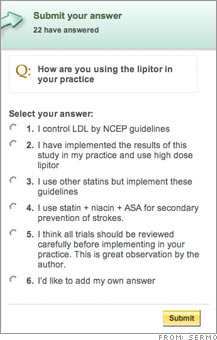A MySpace for physiciansCEO says Sermo provides the biggest online physician community in the world for doctorsNEW YORK (CNNMoney.com) -- Now doctors have their own online community, where they discuss everything from the latest medical break-throughs to potentially faulty drugs. It's called Sermo, not MySpace.
Sermo was founded earlier this year by Dr. Daniel Palestrant. The surgeon noticed that many doctors saw the red flags for Merck's flawed painkiller Vioxx and Medtronic's dysfunctional pacemakers long before they turned into major scandals in the mainstream press. "We knew about these [problems,] but we didn't know how important they were," said Sermo chief executive Dr. Palestrant, based in Cambridge, Mass. "Maybe we could the get physicians themselves to determine what's important and what it isn't." Dr. Palestrant noticed that doctors chatted with other doctors as they walked the halls of hospitals and clinics, but they didn't have an efficient way of reaching the wider medical community. That's why he created Sermo, which is describes as the biggest online physicians' community in the world. "What's motivating physicians is their desire to communicate with one another," said Dr. Palestrant. "So far, the biggest motivator that's causing physicians to log onto the site is for physicians to say, 'I'm seeing this,' or 'I'm seeing that.'" Dr. Palestrant said many of the drug-related online comments focus on unapproved and off-label uses for FDA-approved drugs. and Sermo also serves a tool for physicians to compare notes on the possibility of dangerous or unusual side effects in commonly used drugs. Doctors talk about antidepressants that seem to cause rashes, statins that seem linked to cognitive problems, and vitamins that might be causing lumps. "It there's smoke, there's fire," said Dr. Palestrant. "There's something that needs to be done here. This is sort of the zeitgeist." Doctors vote, in a Netflix-style five-star system, on their level of interest in various medical topics. They also answer multiple-choice questions about their opinions on questions posed by other doctors. Discussion topics have titles like "Lipitor nightmares," a reference to Pfizer's (up $0.27 to $27.03, Charts) top-selling statin, "FDA warning on Tamiflu," referring to the bird flu anti-viral from Roche Holding (Charts), and "Viagra vs. Levitra vs. Cialis," a comparison of sexual dysfunction treatments from Pfizer, Bayer, GlaxoSmithKline (up $0.02 to $51.99, Charts), Schering-Plough (up $0.00 to $21.86, Charts) and Eli Lilly & Co (up $0.18 to $54.74, Charts). Doctors pitch questions and test theories, and anonymity is protected. A physician going by the moniker docDecaf wanted to know what other doctors thought about inoculating girls with Merck's (up $0.10 to $44.75, Charts) Gardasil, a newly-approved vaccine for a sexually-transmitted virus that causes cervical cancer, in patients as young as three. The purpose of inoculating at a young age is to make sure the girls are protected long before they become sexually active. The FDA has approved the vaccine for girls as young as nine. But another doctor wrote into Sermo, saying that three years is too young because the vaccine's protection is believed to last 10 years, so its potency would run out before most girls become sexually active. (Merck spokeswoman Janet Skidmore said Gardasil's duration has been tested out to five years and studies are continuing.) Not all the topics are serious. One of the online surveys asks doctors to vote for their favorite fictional doctor. The ballot includes Dr. Mark Greene of "ER," Dr. Gregory House of "House," and even Hannibal Lecter from "Silence of the Lambs." Dr. "Bones" McCoy of "Star Trek" is a write-in. At least 2,000 doctors are posting questions and voting on the site, said Dr. Palestrant, who noted that only physicians are allowed to participate and they're not charged for the service. The privately held company makes its money by charging institutional investors for the right to see the results on physician votes as they're coming in. The investors don't vote. "As long as you're a licensed physician, you can put whatever you want on the site," said Dr. Palestrant. "What's important is what your colleagues think." Dr. Palestrant said he hasn't taken money from any drug companies so far, though that could change because he's in negotiations with them. The drug makers wouldn't be allowed to weigh in on surveys. But Dr. Palestrant said that physicians seem to prefer a Web site free from Big Pharma influence. Fran Hawthorne, author of "The Merck Druggernaut" and "Inside the FDA," said she wasn't familiar with Sermo, but an online forum is a great way for physicians to learn about side effects, as well as off-label uses not approved by the FDA, which account for about half of all prescriptions. "[Doctors] find out through trial and error and schmoozing, so they need more communication, to find out about the good and the bad," said Hawthorne. Hawthorne said doctors could benefit from any source of pharmaceutical information "without it being a seminar from a drug company." But she suggested that anyone using the Internet as a source of information should adopt a healthy dose of cynicism. "Who's got an ax to grind?" said Hawthorne. "That's always the danger of the Internet. But in general it's a good idea, because you have doctors who presumably know what they're doing." |
|

